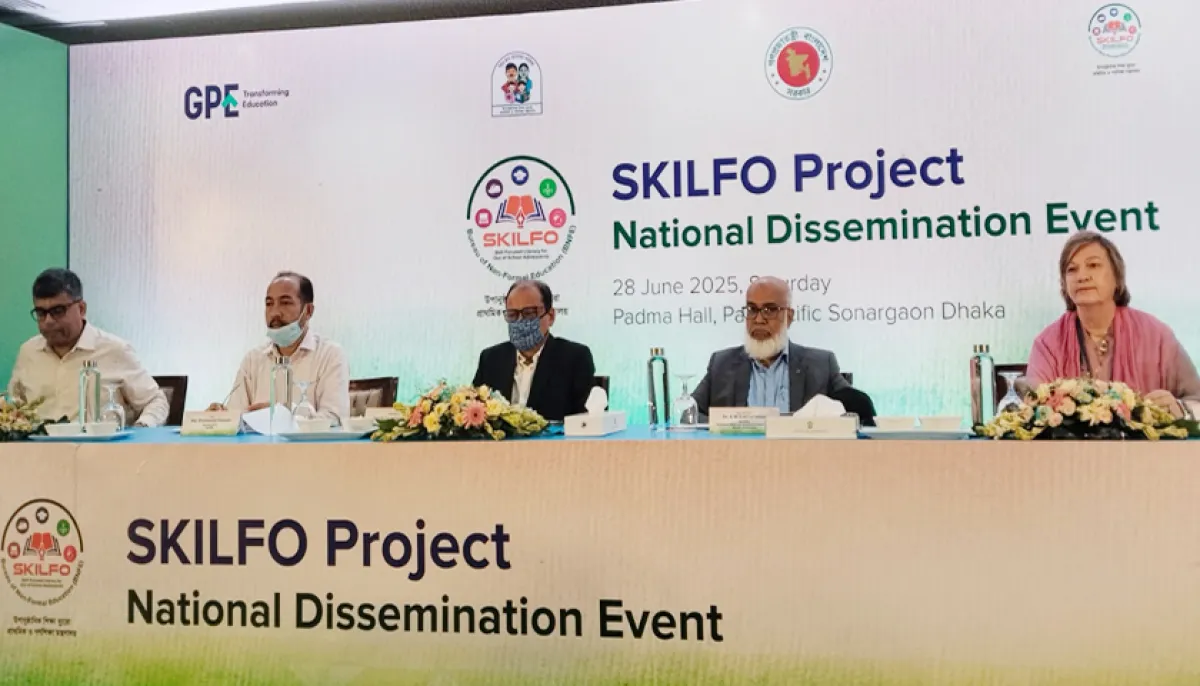 Photo : Dainikshiksha
Photo : Dainikshiksha
The Government of Bangladesh and UNICEF today (June 28) marked a significant milestone in education for out-of-school adolescents, with the successful completion of the Skill-Focused Literacy for Out-of-School Adolescents (SKILFO) pilot project. The project has reached almost 7,000 adolescents, and with the proven success is now ready to be scaled up nationally.
The breakthrough program was arranged at the hotel pan pacific sonogram in the capital today jointly by UNICEF and The Bureau of Non-Formal Education (BNFE) of the Ministry of Primary and Mass Education under the Ministry of Primary and Mass Education.
The SKILFO pilot project, Implemented in Cox's Bazar, this pilot initiative will now expand to 16 districts, offering over 100,000 out-of-school and NEET (Not in Education, Employment, or Training) adolescents a transformative pathway to foundational literacy and market-relevant skills. Target areas were selected based on youth demographics, local skills demand, job market potential, and institutional capacity. The SKILFO pilot in the community of Cox's Bazar focused on functional literacy & numeracy, vocational skills, and digital & financial literacy, all aligned with the Bangladesh National Qualification Framework (BNQF).
The Bureau of Non-Formal Education (BNFE), under the Ministry of Primary and Mass Education (MoPME), with technical support from UNICEF and funding from the Global Partnership for Education Accelerated Fund, designed and piloted the SKILFO initiative in response to Bangladesh's urgent need for a more inclusive and skills-driven education approach. With 2.2 million people entering the labor market annually, but only 1.9% receiving formal skills training¹, the SKILFO model aims to directly address the country's skills gap and contribute to the informal economy.
"The success of the SKILFO proves that out-of-school adolescents and NEET youth with poor levels of literacy can be meaningfully empowered with the right training approaches and the right levels of support and opportunities," said Rana Flowers, UNICEF Representative in Bangladesh. "Strengthening government's commitment to inclusive education and youth empowerment, the next essential steps to the institutionalizing and scale up of SKILFO across Bangladesh through sustained collaboration between the relevant ministries."
Backed by evidence of skill programmes all over the world produced by UNICEF, SKILFO is shifting perceptions of vocational education while reducing risks like crime and child marriage. SKILFO's success lies in its flexible delivery, alignment with market needs, strong community and employer engagement, higher placement rates for girls (83.1%) than boys (81.3%) and use of existing government infrastructure offering promising solutions for NEET youth and connecting them with the world of work.
The pilot's success and evidence-based results prompted MOPME and BNFE to institutionalize the SKILFO model, marking a major step toward ensuring every young person gains the skills to thrive and contribute productively.
The expansion plans include the integration of SKILFO into the Core Non-Formal Education program and national projects. This will create more options for NEET adolescents through institutionalized Alternative Learning Pathways, with the BNFE-Technical Institute partnership setting a 21st-century benchmark for skill-based education using existing facilities and enterprises.
